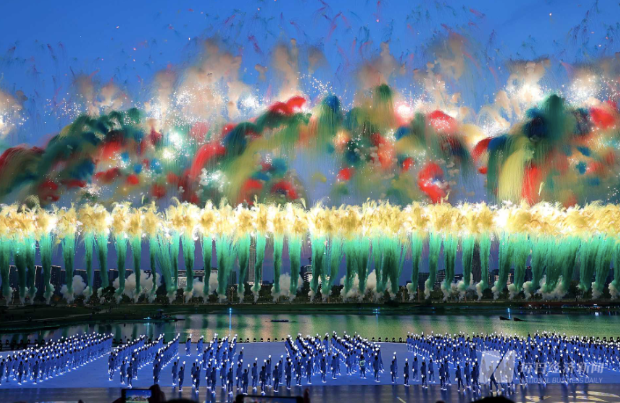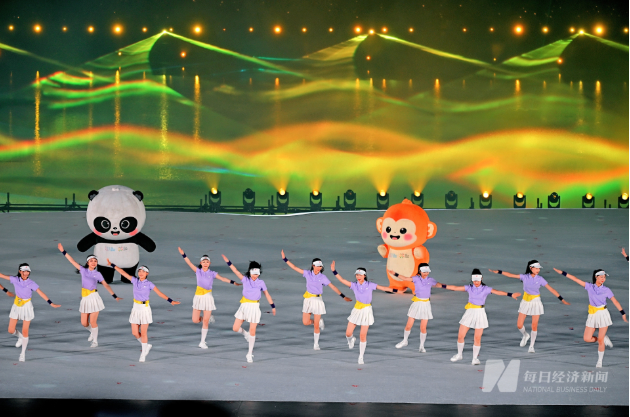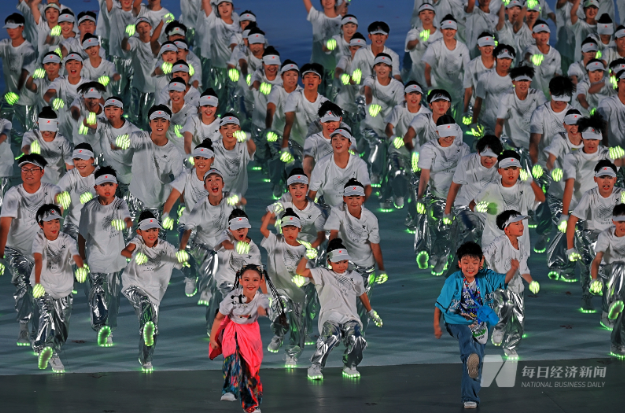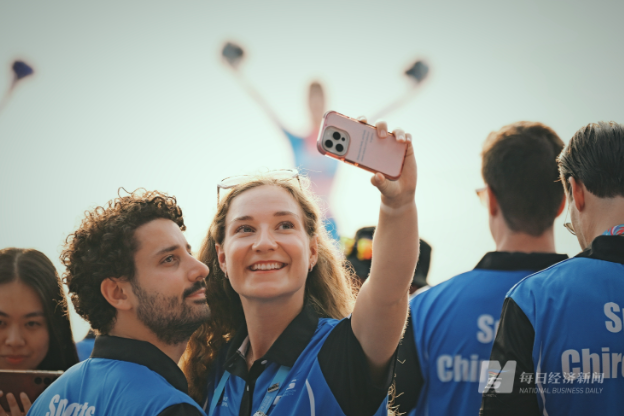
Photo/ Zhang Jian
The World Games, the highest-level international multi-sport event for non-Olympic disciplines, opened in Chengdu, featuring 34 sports, 60 disciplines and 256 events.
At 20:00 on 7 August, the 430-metre roofline of the Chengdu Tianfu International Conference Center was illuminated by segment, signaling the official start of the 12th World Games. The day is also Start of Autumn in the 24 traditional Chinese solar terms.
Scale is only the first sentence of the story. The opening act deliberately stepped outside the usual stadium walls and into Tianfu Park, a 1.2-square-kilometre lake-and-meadow "urban living room". Spectators sat on grass, athletes strolled across wooden walkways, and the city itself became part of the scenography—a literal demonstration of the IWGA's stated ideal of "boundless sports".
Historical echoes reinforce the theme of openness. In 1981, at Santa Clara's inaugural World Games, China collected four badminton golds while the sport was still excluded from the Olympic programme. Sixteen years later, Chinese women weightlifters dazzled in Lahti 1997; footage of those lifts was later looped in IOC executive-board briefings and is widely cited as a tipping point for weightlifting's full Olympic integration at Sydney 2000.

Photo/Zhang Jian (NBD)
IWGA President José Perurena underlined in his curtain-raiser speech: "The World Games are the shop window; Chengdu has simply built the largest display case we have ever had."
The city's capacity to handle the resulting traffic is already proven. Chengdu Tianfu International Airport and Shuangliu International Airport together processed 3.6 million inbound and outbound passengers in the first seven months of 2025, an 11.9% increase year-on-year. Foreign nationals accounted for 884,000 of those movements, up 56.3% YoY. During the pre-Games peak week of this summer, the Chengdu immigration station alone cleared more than 100,000 foreign entries and exits, a 39.2% jump. A 240-hour visa-free transit policy has turned arrival halls into fast lanes rather than bottlenecks.
Culture, however, is where Chengdu converts attention into economic kinetic energy. The visual grammar of the Games is unmistakably local: the torch "Bamboo Dream" (which pronounces the same as "pursue dream" in Chinese) is cast in segments that echo both bamboo nodes and the phoenix patterns of Jinsha relics; the medal "Bamboo Light" carries the Sun-Bird motif on the obverse and laser-etched bamboo leaves on the reverse; the mascots "Shu Bao" (giant panda) and "Jin Zai" (golden snub-nosed monkey) greet visitors in Sichuanese dialect audio loops at every venue.

Photo/Zhang Jian (NBD)
More importantly, these symbols are not confined to souvenir shelves. Ticket holders can, from 7 to 17 August, present their QR codes at 46 museums and 28 scenic spots for free entry—an experiment in "ticket-root economics".
Inside the competition calendar, youth is the dominant colour. The average age of China's delegation is 23.8. The sports themselves read like a scroll of Gen-Z obsessions: parkour, flying disc, sport climbing, flag football, lacrosse and drone racing, etc. Flag football and lacrosse will debut at Los Angeles 2028, so Chengdu offers a scouting mission for Olympic federations and broadcasters.
Venues have been scattered across parks, riversides and even rooftop gardens rather than locked inside single-use stadiums, a layout that encourages spontaneous drop-ins. One day before the game, the Australian national disc-golf squad held an open training session in a community micro-park in the city with local amateurs.

Photo/Zhang Jian (NBD)
In 2024, the total scale of Chengdu's sports industry exceeded 130 billion yuan, and the total scale of sports consumption surpassed 75 billion yuan, representing a year-on-year growth of about 13%. This year, Chengdu is expected to host and undertake more than 80 international and national high-level events, with the total scale of sports consumption anticipated to reach 80 billion yuan and the total scale of the sports industry expected to surpass 150 billion yuan.
As the first autumn dawn breaks, the question is no longer whether Chengdu can stage the World Games, but how thoroughly the Games will stage Chengdu. From the 3,942 athletes chasing personal bests to the street vendors who will remember their names, the city has turned the seasonal change into a planetary rendezvous.


 川公网安备 51019002001991号
川公网安备 51019002001991号





